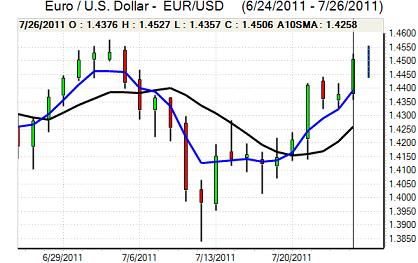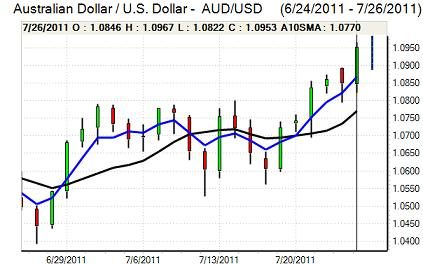EUR/USD
The Euro again hit resistance above 1.45 against the dollar in early Europe on Wednesday and retreated back to below this level as uncertainty over the Euro-zone situation increased again.
German Finance Minister Schauble warned that there was no blank cheque related to EFSF funds although he also stated that there should be no un-controlled exits from the Euro area. There was a fresh widening of peripheral yield spreads during the day which undermined confidence in the Euro as Italian and Spanish yields rose sharply during the day with Italian benchmark yields above 5.80%. ECB President Trichet in an unusual comment stated that it would be a mistake to bet against Greece. Standard & Poor’s cut the Greek debt rating to CC from CCC and stated that Greece would be in partial default following the restructuring.
The US Beige Book reported that activity had slowed in some districts during the past few weeks and there was also a weaker than expected durable goods report with a 2.1% decline for June.
There was no progress on the US debt talks as the House of Representatives worked to amend the deficit-reduction plans. There is likely to be a vote on Thursday, but even if the plan is approved, its unlikely to pass in the Senate and there will then need to be a compromise deal.
Market tensions will inevitably increase over the remainder of the week with the August 2nd deadline approaching rapidly and there were further fears that the US would lose its AAA credit rating. The US and Euro-zone continued to vie for market dominance and Euro fears tended to dominate during the US session with the Euro weakening sharply to lows near 1.4330 before a limited recovery.

Source: VantagePoint Intermarket Analysis Software
Call now and you will be provided with FREE recent forecasts
that are up to 86% accurate * 800-732-5407
If you would rather have the recent forecasts sent to you, please go here
Yen
The dollar found support above 77.50 against the yen during Wednesday and pushed to a high above 78.15, although it was unable to sustain the move above 78. There was further market speculation over intervention which deterred aggressive US selling.
There was a persistent lack of confidence in the dollar and Euro which maintained underlying demand for the Japanese currency, especially when equity markets retreated.
The Japanese retail sales data was stronger than expected with a 0.4% increase in the year to June, the first annual increase for four months. There were still fears over the competitive situation which maintained pressure for action on the currency. There were further warnings from officials, but no evidence of actual intervention.
Sterling
Sterling hit resistance above 1.6420 against the dollar during Wednesday and dipped weaker during the day, primarily under the influence of a stronger US currency with lows below 1.6320 as Sterling did make some headway against the Euro with a move back to below 0.88.
The UK economic data provided no support with the CBI industrial trends survey weakening to -10 for July from +1 previously, increasing doubts whether the manufacturing sector would be able to make a significant positive contribution.
Bank of England MPC member Miles was the second this week to warn that the UK economy could retreat back into recession, although this was not his expected outcome. He also stated that inflation was a real concern, illustrating the difficulties faced by the Bank of England, but markets will expect rates to stay extremely low which will sap yield support.
In the very short term, Sterling was still able to draw some support from a lack of confidence in the Euro-zone and US economies, although sentiment could deteriorate rapidly.
Swiss franc
The dollar found some support close to 0.80 against the franc during Wednesday, but was unable to move significantly away from this level as underlying franc demand increased again. There were renewed pressures on the crosses as the Euro dipped to below the 1.15 level as risk appetite faded again.
The franc continued to draw defensive support from a lack of confidence in the dollar and Euro as both economic blocs attempted to tackle serious structural vulnerabilities.
Domestically, the KOF index weakened to 2.04 for July from 2.23 previously and, although still robust in historic terms, there will be unease over the recent deterioration in confidence surveys.

Source: VantagePoint Intermarket Analysis Software
Call now and you will be provided with FREE recent forecasts
that are up to 86% accurate * 800-732-5407
If you would rather have the recent forecasts sent to you, pleasego here
Australian dollar
The Australian dollar pushed to a high above 1.1070 against the US dollar on Wednesday and found support in the 1.10 area as retreats continued to secure strong buying support. The Australian currency continued to gain support from fears over the US outlook and risk of a credit-rating downgrade and proved resilient even when equity prices declined.
There was also speculation that the Reserve Bank could move to increase interest rates at next week’s policy meeting which provided further support for the currency.



